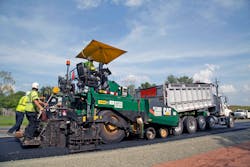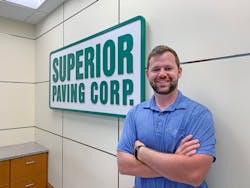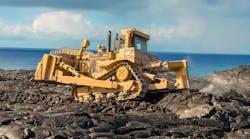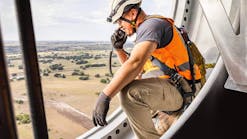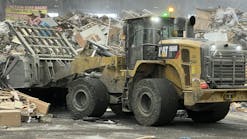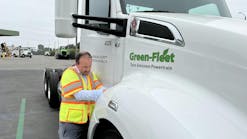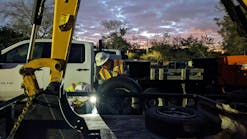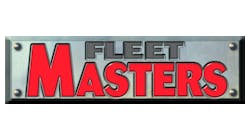Tyler Mitchell represents the future of data-driven construction fleet management and Superior Paving’s link to continued success.
Superior Paving Corp. is the 2022 Fleet Master in the small-fleet category, with an estimated replacement value less than $100 million. Since 2004, Construction Equipment and the Association of Equipment Management Professionals (AEMP) have been recognizing professionals in asset management with the Fleet Masters Awards.
Mitchell’s title, total process reliability coordinator, differs from more common fleet manager labels, but it well describes his holistic approach to fleet efficiency. At age 29, he speaks “data” fluently, and he respects and listens intently to other professionals in his industry. Working with Tom Eckler, general shop and equipment manager, and supported by Mike Brewer, director of information technology, Mitchell helps Superior Paving to project what equipment it will be buying and selling over the next 10 years.
Part of that plan is fleet efficiency and reliability. Mitchell and Eckler work hand-in-hand to track equipment utilization and determine rates.
“Eight years ago, we shut down production at our company for the day to communicate our new initiatives toward Total Process Reliability,” says Mitchell. “We gathered all our employees and shared that we were making a commitment toward equipment efficiency and management.
“Technology is a huge part of our equipment’s efficiency,” he says. “We use a real-time reporting program that tracks what we use, how much we use, how often we use it, and what kind of lead time orders require.” Mitchell pulls equipment health and utilization data to follow progress on projects to ensure jobs have the right machines available when needed. Balanced utilization and predictive maintenance are at the core of Mitchell’s reliability plan.
Mitchell’s holistic approach to TPR comprises everyone working at Superior, including administration and non-shop employees who would otherwise never touch yellow iron in their daily tasks. Each month, every piece of equipment goes through an audit. Regardless of what department they usually work in, every employee is assigned two vehicles to do an in-depth walkaround.
Mitchell says that using Superior’s non-equipment people provides a fresh perspective and gives everyone a better sense of what the company does and an opportunity to take ownership of Superior’s success.
The auditors are usually accompanied by an operator or mechanic. The average audit takes about 20 minutes to complete a checklist, which is tailored to that specific vehicle’s maintenance history and application. Auditors enter their observations into the mobile app component of Auto ShopKeeper, Superior Paving’s fleet-management software that was designed in-house by Brewer. (Read more on the asset management app here.)
“One of my favorite parts about our audits is if a piece of equipment isn’t up to standards, the app immediately generates a service request,” he says. “The service request goes directly to our planning and scheduler within a minute of the audit being submitted. This allows a quick response to any items that are found to be defective before they cause a breakdown.
“Anyone within our company can pull up an equipment category or a single piece of equipment and get a PDF copy of the audit within a minute of completion,” he says. “Managers get updated audits of their machines and stay more informed of the condition of their equipment.”
Using deeper data in fleet management
“Using information from all our departments, we have developed a methodology (CAP-X) for projecting what we will be buying and selling over the next 10 years as part of our acquisitions and risk management process,” Mitchell says. “CAP-X enables us to track our equipment and make informed decisions about when to buy or sell a piece of equipment based on getting the greatest return for the equipment before it becomes a large financial burden. Every year we aim to spend no more than 3 percent of our annual revenue replacing equipment. We’ve refined this process to the point that we are currently spending only 89.41 percent of our 2021 equipment replacement budget. Our CAP-X process permits us to identify and order equipment we need to buy or sell at the end of 2022. This is approximately 86 percent of the projected equipment expenditure budget.
“We strive to sell equipment before its value drops significantly so we can optimize how much we are able to capture to offset the purchase of new equipment,” Mitchell says. “For example, at the beginning of this year when we prepared to sell our dump trucks, we had an average 41.78 percent return.”
Mitchell also uses a report called the “bad actors list” to monitor different makes and models of equipment in their fleet.
“We keep track of each vehicle’s performance history so we can determine what equipment works best,” he says. “We have factory warranties on every piece of equipment and the CAP-X plan allows us to purchase extended warranties only on vehicles that show a need.”
Every Wednesday, operations conducts a meeting to discuss what equipment is scheduled for preventive maintenance in the next week, what projects the shop is working on, and their expected completion dates.
“We began our Crew Maintenance Policy in 2021 that guides crews if they need to do minor equipment repairs instead of sending a technician to the field,” Mitchell says. “In 2021 this policy resulted in 233 fewer emergency calls compared to 2020. That meant roughly 700 technician man hours were spent in the shop instead of in the field.
“We recently updated our RCA (Root Cause Analysis) Program with a PDF fillable investigation form which allows us to investigate each incident in the same systematic manner every time and understand what is happening,” he says. “This policy allows us to identify trends and apply solutions to prevent the issue from happening again.”
Mitchell’s passion for accurate data analysis applies to outsourced vendors as well.
“We outsource 16.59 percent of our preventative maintenance and have written standards for our PM services so each individual piece of vendor-serviced equipment is completed the same time the same way every time.” These standards also define Mitchell’s expectations on work performed.
Mitchell says he wants everyone to answer one simple question when they arrive at work each day: ”Do I have what I need to work safely today?”
“Safety is a huge part of our company’s culture,” he says. “It’s a reminder that safety requires the commitment and participation of every employee. Once a month we have a safety committee meeting, which includes different departments and positions throughout the company. This diverse pool of employees gives us various perspectives and reminds every employee that he or she has responsibility maintaining our safety culture.
“We conduct annual safety training with 100 percent of our workforce and TPR coordinators participate in all new hire orientations to discuss our total process reliability programs.”
